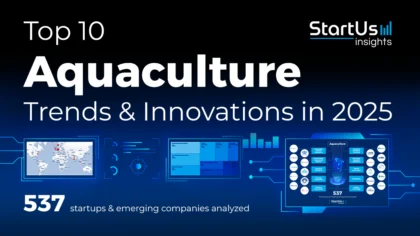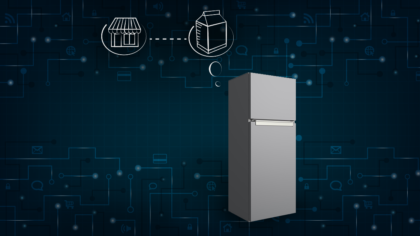Accelerate Productivity in 2025
Reignite Growth Despite the Global Slowdown
Staying ahead of the technology curve means strengthening your competitive advantage. That is why we give you data-driven innovation insights into AgriTech. This time, you get to discover 5 hand-picked water management solutions.
Global Startup Heat Map highlights 5 Top AgriTech Startups developing Water Management Solutions out of 643
The insights of this data-driven analysis are derived from the Big Data & Artificial Intelligence-powered StartUs Insights Discovery Platform, covering 2 093 000+ startups & scaleups globally. The platform gives you an exhaustive overview of emerging technologies & relevant startups within a specific field in just a few clicks.
The Global Startup Heat Map below reveals the distribution of the 643 exemplary startups & scaleups we analyzed for this research. Further, it highlights 5 AgriTech startups that we hand-picked based on criteria such as founding year, location, funding raised, and more. You get to explore the solutions of these 5 startups & scaleups in this report. For insights on the other 638 water management solutions for agriculture, get in touch.
Umida AG develops a Subsurface Irrigation System
Due to the increasing impact of climate change, food producers are struggling to consistently source enough water. This further adds to freshwater scarcity. Moreover, conventional agricultural water management systems are inefficient since they waste water by overwatering. This leads to damaging plants and reducing yields. That is why startups build irrigation systems that minimize water wastage, enabling farmers to reduce their water costs as well as use water sustainably.
Umida AG is a US-based startup that creates Aquifer Pipe, a subsurface irrigation system for orchard crops. The startup uses acrylonitrile butadiene styrene (ABS) to manufacture Aquifer Pipe at 10- and 20-foot lengths. In the field, the pipe is buried under service roads and promotes the natural flow of water into the surrounding soil using gravity. As a result, plant roots make their way down to the moisture plume that provides high levels of oxygen and water. In this way, UmidaAG prevents water from reaching the surface and reduces water loss due to evaporation.
Aquasend enables Water Quality Monitoring
Water quality management is an integral part of marine and inland fish farming. It determines the hygiene and growth of the fish in rearing, similar to feed quality and water temperature. However, aquaculture concentrates on anoxic sediments and intensifies oxygen demand at sea bottoms. Additionally, aquaculture increases ammonia, inorganic phosphorus, nitrate, and nitrite content that leads to eutrophication. To tackle these issues, startups develop aquaculture water monitoring and management systems. This, in effect, allows fish farmers to continuously monitor and track water conditions such as pH and temperature, among others.
US-based startup Aquasend develops Aquasend Beacon, a water sensor for real-time water quality monitoring. Aquasend Beacon senses dissolved oxygen levels and temperature of the water and then transmits it to the startup’s online portal. In addition, the sensor communicates with other sensors in a mesh-networked arrangement across long distances for efficient monitoring of farms that have multiple ponds. Additionally, it comes with a global positioning system (GPS) to determine the buoy-to-pond location and an anti-fouling design to minimize algae growth. To further assist the farmer, Aquasend Beacon enables continuous monitoring as well as provides instant alarms and alerts when it detects anomalies.
BrioAgro advances Automatic Irrigation
Traditional agricultural water management systems utilize a significant part of cultivation land for preparing channels and distributions. However, through these systems, areas at lower altitudes receive excess water that causes prolonged waterlogging, leading to poor yields. The excessive waterlogging further increases soil salinity, making it unsuitable for cultivation. To this end, startups build automatic irrigation systems that tackle these issues. As a result, food producers streamline their irrigation for precise applications as well as reduce water and nutrients runoff.
Spanish AgTech startup BrioAgro offers AQUA, an automatic irrigation system for vineyards and greenhouses. The startup combines its ViTA 7 ground sensors and artificial intelligence (AI) to provide real-time crop, soil, and meteorology data. The startup’s intelligent system presents this data and enables the controlling of autonomous irrigation operations via an accompanying smartphone app. This allows farmers to save water, electricity, and fertilizers as well as increase yield and improve quality.
CroBio provides a Biologically Active Water Retention Solution
Improving soil water retention is an effective way to manage water for agricultural applications. But conventional practices only combine tillage methods and plants with high root density to improve soil water holding capacity. To advance this capability, AgriTech startups develop solutions that increase water retention. For example, retention agents based on swelling polymer crystals capture water during rain or watering and then release it slowly into the soil. Such solutions further enhance soil quality and save water management costs for farmers.
CroBio is a British biotechnology startup that develops a biologically active water retention solution. The startup utilizes genetically engineered root-associated bacteria to produce a water-retaining cellulose matrix. Normally, this bacteria is found around the roots of corn, wheat, and soybean. Thanks to CroBio’s solution, farmers increase agricultural water retention and reduce environmental water loss as well as increase crop yield.
Solugen develops a Wastewater Recycling System
Livestock rearing uses a significant share of global freshwater. Further, the growing global population and our consumption habits are also advancing livestock production, thereby increasing water demands. Thus, improving water productivity in livestock production is essential to tackle this challenge. Animal agriculture achieves this by reducing freshwater consumption by recycling the wastewater from the farm and using integrated agriculture. As a result, the livestock water productivity (LWP) increases.
Canadian startup Solugen provides a wastewater recycling system for animal farming. The startup separates solid and liquid waste using a centrifuge and then combines lime treatment, azeotropic distillation, and internal water cycling to treat manure. This allows livestock farmers to recycle polluted water and reduce dependence on freshwater while using the treated manure as fertilizer. In turn, Solugen’s recycling system improves the sustainability of animal farming while increasing production capacity.
Discover more AgriTech Startups
AgriTech startups such as the examples highlighted in this report focus on precision farming such as smart irrigation, water quality monitoring, wastewater recycling as well as water retention solutions. While all of these technologies play a major role in advancing the agricultural industry, they only represent the tip of the iceberg. To explore more agricultural technologies, simply get in touch to let us look into your areas of interest. For a more general overview, you can download our free AgriTech Innovation Report to save your time and improve strategic decision-making.








